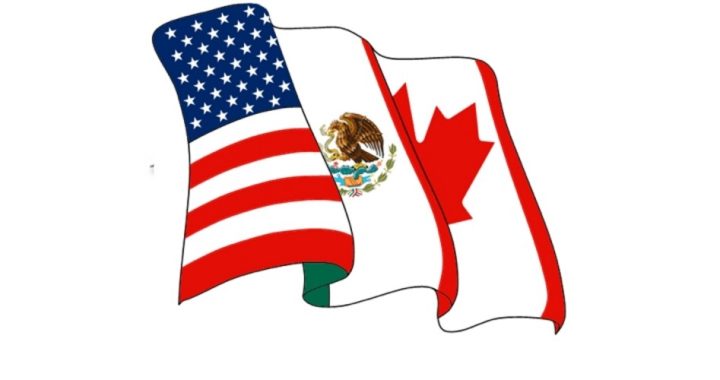
For a man who has free-associated his way to within one step of the presidency, presumptive Republican nominee Donald Trump has one thing right: Free trade agreements have decimated manufacturing jobs in the United States.
For generations, the number of jobs in the manufacturing sector told the tale of robust production of American goods. The figure exceeded 16 million during the latter part of World War II as women joined the workforce. The combination of the end of the war and the return of healthy growth in the wake of the Great Depression ushered in “The Golden Age of Capitalism,” a period that lasted more than 30 years.
Manufacturing employment climbed throughout that period, peaking at 19.5 million in 1979. The double-dip recession of the early 1980s pared nearly three million employees from total payrolls, but the sector recovered quickly afterward. Growth was modest through the reminder of the century, but as of February 2001, there were still over 17 million people working in factories in the United States — 12 percent of the labor force.
Manufacturing Employment Has Cratered
Over the next 10 years, the sector lost more than five million workers, nearly one third of the year 2000 total. Now, despite an economic expansion about to hit the seven-year mark, it has barely improved, with the economy generating less than one million new manufacturing jobs. Today, manufacturing represents just 7.7 percent of the labor force. How has that impacted the economy?
According to the Federal Reserve Bank of St. Louis, the average manufacturing wage was $14.55 per hour as of February 2001. Assuming a 40-hour workweek, the sector would have generated $515 billion in total salaries. Fast forward to February 2016: After adjusting for inflation, manufacturing wages are effectively at three-quarters their former level, despite an economy that is 73 percent larger. Clearly, a major drag on consumer spending — and, commensurately, glacial economic growth over the past 15 years — is the dramatic decline of manufacturing jobs in the United States.
U.S. Exports Have Grown More Slowly Than Those of Other Countries
One of the apparent paradoxes of the new millennium has been that despite the drop in U.S. manufacturing employment, exporting has been on the rise.
Following the Dot Com recession, exports increased from $237.4 billion during the first quarter of 2002 to $481.6 billion in the third quarter of 2008. After declining sharply during the Great Recession, exports started up again, peaking at $588.9 billion during the fourth quarter of 2014. As of the final quarter of 2015, they had slipped to $544.3 billion — still 2.3 times their 2002 levels.
However, what gets lost in the statistics is that a number of other countries have done substantially better. China has experienced a seven-fold increase in exports over that period, and India nine times over. Even Russia has seen its exports rise by a factor of five. So many countries have exceeded U.S. growth in trade since 2000 that the net effect is a growing domestic trade imbalance. For 2015, the balance of payments stood at a deficit of $585.6 billion. By contrast, it was -$112.3 billion the year NAFTA took effect.
Trump’s Comments About NAFTA and TPP
The North American Free Trade Agreement (NAFTA) was signed into law by President Clinton on December 8, 1993. Despite its being billed at the time as a jobs-producer, EPI economist Robert Scott has suggested that 682,900 U.S. jobs were “lost or displaced” due to the agreement.
Trump has made renegotiating or breaking this and other agreements a signature issue of his campaign, asserting,:
[NAFTA] is a disaster. We will either renegotiate it, or we will break it. Because, you know, every agreement has an end. Every agreement has to be fair. Every agreement has a defraud clause. We’re being defrauded by all these countries. We need fair trade. Not free trade. We need fair trade. It’s got to be fair.
The Republican presidential candidate doesn’t mince words about the Trans-Pacific Partnership (TPP), either:
The deal is insanity. Nobody understands it. The deal is so bad because of the fact they don’t cover currency manipulation. It’s the number-one weapon used by foreign countries to hurt the United States and take away jobs.
As proven by the loss of U.S. manufacturing jobs, slow export growth relative to China, India, and other quickly-growing economies and a burgeoning trade imbalance, Trump is in the right with respect to free trade agreements such as NAFTA and TPP.
What Can Be Done About It?
NAFTA has been on the books for more than 22 years. The Trans-Pacific Partnership, by contrast, has yet to be ratified by Congress, and likely faces rough sledding there. As Alex Newman wrote in The New American in February:
With opposition to TPP surging all across America and the political spectrum, the globalists and crony capitalists supporting Obamatrade may have a tougher time getting it rubber-stamped in Congress than they expected.
Let’s tackle the TPP first. The Trans-Pacific Partnership can — and should — be defeated by Congress. As NAFTA has proven, trade agreements of this type clearly do not benefit the United States. There is simply no evidence this accord will change the trajectory of manufacturing job losses that have plagued the U.S. economy over the past 15 years.
As for the North American Free Trade Agreement, it is puzzling that despite millions of job losses and slow export growth relative to other economies, there has been little political momentum toward scuttling the agreement.
Even Democrats are coming out against these sorts of jobs-killing accords. Not only have Democratic presidential candidates Bernie Sanders and Hillary Clinton renounced the “gold standard” TPP, but Clinton said the following about NAFTA to moderator Tim Russert during a 2008 debate against then-candidate Barack Obama:
I have said that I will renegotiate NAFTA, so obviously, you’d have to say to Canada and Mexico that that’s exactly what we’re going to do. Yes, I am serious. I will say we will opt out of NAFTA unless we renegotiate it, and we renegotiate on terms that are favorable to all of America.
Donald Trump may have a generally poor fact-checking record and is all over the board on many issues, but with respect to trade, he’s right on the money. NAFTA and TPP are disastrous for the U.S. economy.
As author/philosopher Edmund Burke once wrote, “Free trade is not based on utility, but on justice.” It’s time for justice to be served.
NAFTA logo: AlexCovarrubias



